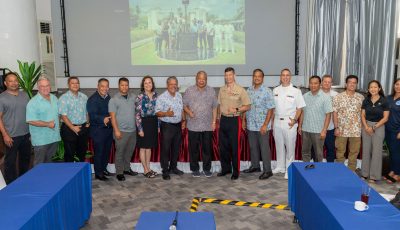HPO aims to fill archaeologist post but…
The CNMI Historic Preservation Office has set a $65,000 salary for their staff archaeologist position but prospects appear dim. Their previous archaeologist was the only applicant for the job after it had been vacant three years, according to HPO.
This week the Historic Preservation Office review board directed HPO management to seek the services of Dr. Thomas F. King, a known Amelia Earhart expert and scholar familiar with the Marianas, to help comment on impact documents for military training on Pagan and Tinian. Meanwhile, HPO disclosed that they have had talks with the Finance office to “restructure” their full-time equivalent historian position to further fund the archaeologist job.
During the CNMI Historic Preservation Review board meeting on Tuesday, HPO revealed that they have set $65,000 salary for the position paid out using federal money supplemented with local funds. Past budget for the salary was at $41,000.
Vice chair Dr. Hiro Korishini recommended that the salary be made commensurate with qualifications and experience. He noted that a person just out of graduate school would not make the $65,000 amount, adding that salary should be based on how much the person is worth, not the position.
He also recommended that Dr. King be contacted for his services, or his help in finding people to help HPO.
According to HPO, their previous archaeologist, Eric Lash, was the only applicant who came out for the position when it was vacant from 2011 to 2014 before he came on board.
To further fund the position, HPO management noted ongoing talks with the Department of Finance to have local funds budgeted for a historian be restructured for an archaeologist.
Noting the DEIS for Pagan and Tinian, board member Don Farrell asked both Department of Community Affairs Secretary Laura Ogumoro and HPO director Merti Kani if one archaeologist was adequate. They both said, “No.”
On the DEIS for Pagan and Tinian, HPO disclosed that Lash “has agreed to participate in consultation meeting on a voluntary basis.”
Farrell stressed the important of guidance on Section 106 talks of the National Historic Preservation Act, which compels federal bodies like the military to address issues of impact to historical sites.
“There are going to be things on Tinian that are going to be destroyed,” Farrell said of the impact.
For the Section 106 talks, Farrell said they will need to issue a “programmatic agreement” between the people of the CNMI affected and the people causing the effect.
“What will they need to do to protect or ameliorate those [adverse] impacts?” he said of the questions that must be asked.



























